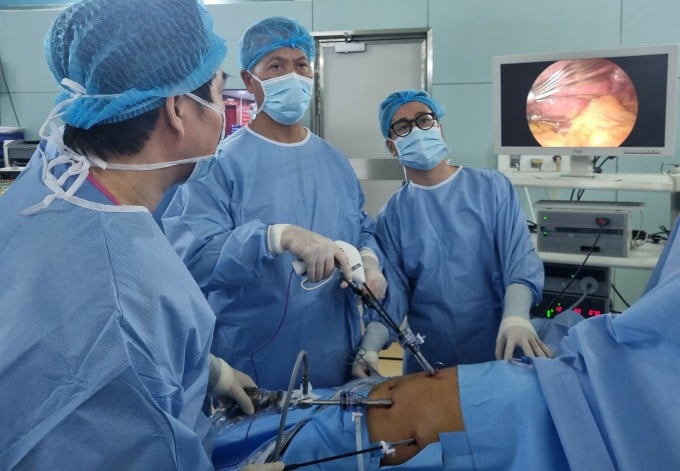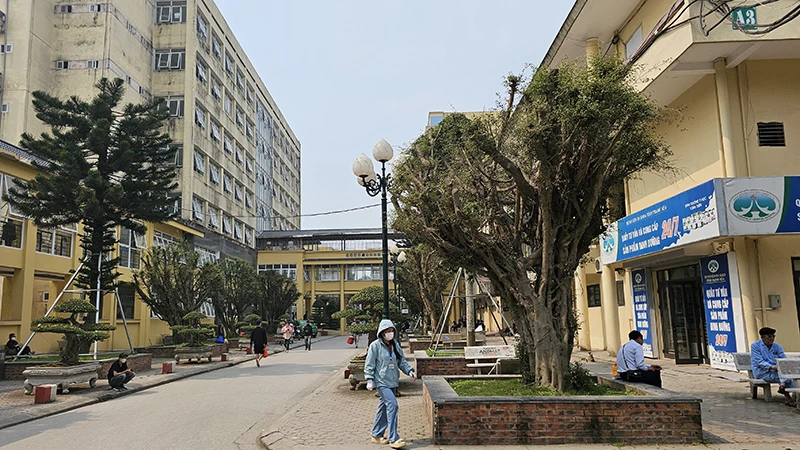About 7 million Vietnamese people suffer from gastroesophageal reflux, of which 60% do not receive timely treatment, leading to the risk of dangerous complications such as esophageal stricture and cancer.
Statistics from the Vietnam Internal Medicine Association were shared by Dr. Nguyen Phuc Minh, Head of the Department of Digestive Surgery, Binh Dan Hospital, at the scientific conference on updating the treatment of gastroesophageal reflux disease (GERD), on May 6. It is estimated that about 5-10% of the population suffers from this disease.
In which, gastroesophageal reflux is a condition of reflux of fluid and food from the stomach causing symptoms or complications. The disease appears due to changes in the stomach-esophageal valve that makes this valve unable to close tightly, causing fluid from the stomach, including acid and bile to reflux into the esophagus.
According to Dr. Minh, the hospital receives about 2,000-2,500 visits every day, of which about 200 people have reflux symptoms. Most of the patients have been examined at many medical facilities, often using long-term medication, but still relapse. Many cases admitted to the hospital have serious complications such as inflammation, esophageal stricture, and the patients cannot eat or drink anything.
"In people with this disease, gastric juice, which is acidic, refluxes into the esophagus, causing prolonged esophagitis, leading to esophageal stricture due to inflammation," the doctor analyzed. The disease also increases the risk of developing esophageal adenocarcinoma. In addition, chronic gastroesophageal reflux can also lead to Barrett's esophagus - which can develop into cancer.
If not treated effectively, people with gastroesophageal reflux disease may have to endure the symptoms of the disease for the rest of their lives. The disease causes many discomforts such as sore throat, heartburn, bad breath, difficulty swallowing, difficulty swallowing, vomiting of sour food or liquid, chest pain or epigastric pain, laryngitis, persistent cough, shortness of breath, chest tightness.
The disease is more likely to appear in people who are overweight, obese, have prolonged stress, have gastric ulcers, have unhealthy eating habits and certain medications. In some cases, treatment is very complicated and patients often go to see a gastroenterologist when the reflux is at a moderate or severe level, causing a lot of impact on the quality of life.
Regarding treatment, patients are usually prescribed medication for about 8 weeks with proton pump inhibitors (PPIs). After that, the doctor will re-evaluate to decide whether to continue taking medication or have surgery. Patients need to be examined in depth to evaluate abnormalities of the gastroesophageal valve folds, measure esophageal peristaltic pressure and esophageal pH to diagnose before deciding on surgery.
On this occasion, two patients with persistent gastroesophageal reflux accompanied by hiatal hernia were operated on by Professor Ninh Nguyen, Head of Surgery Department, University Hospital Irvine (USA) and doctors from Binh Dan Hospital, using the new Omega 300 AP technique to create anti-reflux valves. This is an advanced method currently being applied to treat gastroesophageal reflux disease in the US.

Professor Ninh Nguyen and doctors from Binh Dan Hospital performed surgery to create a valve to prevent gastroesophageal reflux on the afternoon of May 6. Photo: Tran Nhung
Doctors recommend that everyone maintain a reasonable weight, do not lie down immediately after eating, do not work or exercise immediately, but need time to rest. Avoid foods that increase stomach acid, gas-producing substances, and produce a lot of fluid. Sleep with your head and shoulders elevated, and lie on your left side.
Le Phuong
Source link





![[Photo] Prime Minister Pham Minh Chinh receives Mr. Jefferey Perlman, CEO of Warburg Pincus Group (USA)](https://vstatic.vietnam.vn/vietnam/resource/IMAGE/2025/4/18/c37781eeb50342f09d8fe6841db2426c)
![[UPDATE] April 30th parade rehearsal on Le Duan street in front of Independence Palace](https://vstatic.vietnam.vn/vietnam/resource/IMAGE/2025/4/18/8f2604c6bc5648d4b918bd6867d08396)
























































































Comment (0)